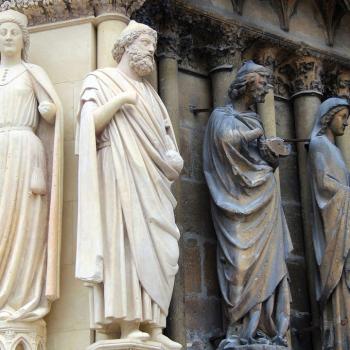"Practice hospitality." Romans 12:13
Fuller seminary's J. Dudley Woodberry makes a distinction between "proselytizing" and what he calls "gracious evangelism."
This distinction seems etymologically valid. To "proselytize" is to create converts. To evangelize is to share the evangel — the "good news."
Proselytizing has acquired new legal baggage in recent years, which is one reason for Woodberry to distance himself from the term. Now that the folks at Fuller are receiving federal funding for their interfaith conflict resolution efforts, they must be careful to abide by the regulations for such "faith-based" initiatives, and those regulations forbid "proselytizing."
But I think Woodberry is more concerned with a theological distinction than a legal one.
Christians are commanded to evangelize. This command is presented as an obligation of gratitude — "freely you have received, freely give." We are not, however, told we must make converts. That seems to be God's job, not ours.
Evangelism, properly understood, is a form of hospitality. Like all hospitality, it is an obligation, a moral imperative. But it cannot be imposed. Hospitality is an invitation — "welcome," "make yourself at home," "take a load off," "taste and see" — not an imposition.
The Southern Baptists who are angry at Fuller's willingness to forgo proselytizing Muslims betray a lack of empathy — an essential virtue for hospitable evangelism.
Imagine a delegation of devout Muslims arriving in Louisville, Ky., and knocking on the door of Al Mohler's office at Southern Baptist seminary. "God is great," the visitors say. "We are here to convince you to accept the one true faith."
Now I like to think that the bellicose Mohler would behave with more grace than he displays before the television cameras and would politely and respectfully welcome these visitors. But I would not imagine or expect their mission to succeed. Mohler, like his visitors, already believes he has found the one true faith, and he won't be readily inclined to abandon it.
Such a visit, if it were to actually occur, might go a long way to helping Mohler and others like him to appreciate the shoe-on-the-other-foot considerations that empathy demands.
Such empathy does not preclude the hospitable, "gracious evangelism" Woodberry describes, and "would not prevent either side from sharing their respective faiths."
But such empathy and hospitality does rule out the graceless — and ineffectual — proselytizing that Mohler seems to consider a pillar of his faith.
With regard to hospitality as practiced at Fuller, I was encouraged to read this announcement from the seminary's Web site:
As part of Fuller Seminary’s focus on the Muslim celebration of Ramadan, Aslam Abdullah, the editor of The Minaret and Sireen Sawaaf, Hate Crimes Prevention Coordinator at Muslim Public Affairs, will be speaking on Fuller’s Pasadena campus at 10 a.m. in the Garth.















